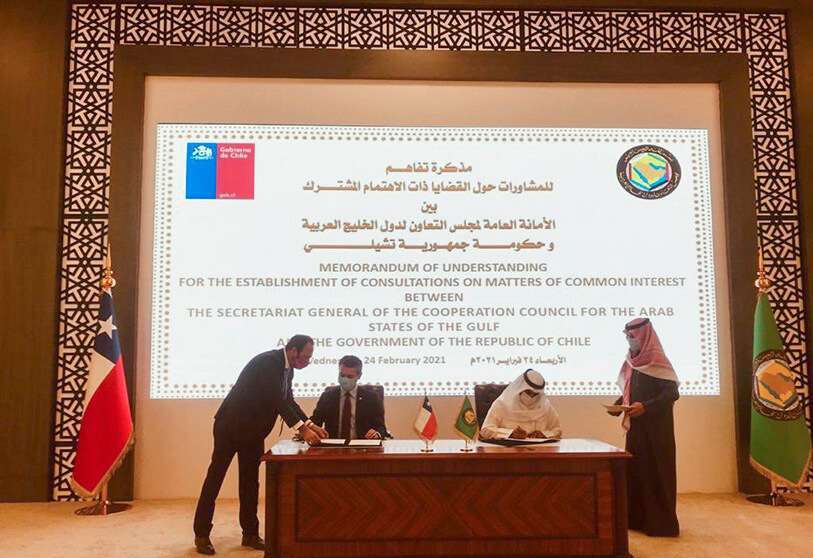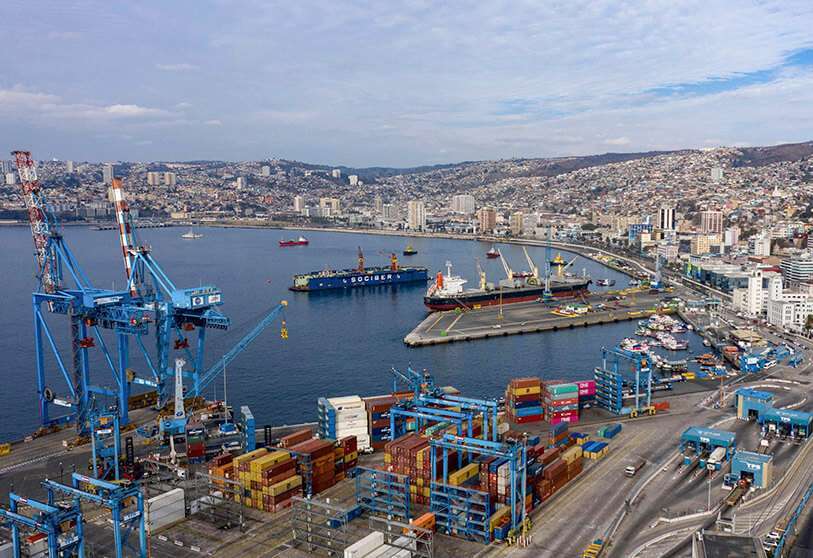Chile moves closer to a free trade agreement with the Gulf region

The Chilean Deputy Minister of Trade of the Ministry of Foreign Affairs, Rodrigo Yáñez, began a diplomatic tour of the Gulf region on Monday 22 February, which ended on 27 February. The purpose of this visit, which included Saudi Arabia, Kuwait and Qatar, was to deepen trade relations with the Gulf countries, attract new investment and advance talks on a possible free trade agreement. The culmination of this tour came with the signing of a Memorandum of Understanding with the General Secretariat of the Cooperation Council for the Arab States of the Gulf (GCC). This document will lay the foundations for closer cooperation in the areas of trade and investment, also seeking a future free trade agreement between the two. Chile seeks, in this way, to use the Gulf countries as a gateway to the Middle East and North Africa region, in the same way that Chile will open the door to Latin American nations.
The Republic of Chile defends and highlights its role as an articulator of trade in the Latin American region through its extensive network of trade agreements, which includes 30 agreements with more than 65 economies, allowing preferential access to more than 88% of the world's GDP. Undersecretary Yáñez noted the favourable progress of negotiations with the six GCC member countries. He added that "for the strategy of diversification of the export basket and destination markets, we are working hard with the Gulf countries in the Middle East. There is no minute to lose for our economic revival, so it is in our interest to strengthen and enhance investment and trade with that region". "For the first time", said the Chilean high representative, "we have a formal understanding with the GCC to structure dialogues on different issues". Chile's Undersecretariat of International Economic Relations stated that, from 2003 to 2020, exports between Chile and the GCC expanded at an average annual rate of 3.4%.

The Chilean authority discussed with the GCC aspects of food security, an issue in which Chile can be a valuable partner for the Gulf because of its great agro-industrial potential. Yáñez said that talks with officials on his visit to Qatar focused on the ties of friendship that bind the two countries and the great space that exists to establish public-private partnerships that will soon boost bilateral trade. He highlighted the complementarity that exists between their economies and the role that Chile, as an important food supplier to the area, could play in the food security strategy that most Gulf States have proposed. In addition, Santiago is looking to harness solar and wind energy into green hydrogen as part of a commitment to zero net emissions by 2050. Chile is not only looking to expand agricultural exports to the region, but also to promote this green energy alongside potential infrastructure investment opportunities, with a particular focus on sovereign wealth funds. The Gulf countries "want to transform themselves into renewable energy and green hydrogen powerhouses from an investor point of view," Yáñez said. "We also want to present Chile's opportunities, showing the deployment of public policies to strengthen the sector in which Chile has the potential to be a competitive global player."

Currently, the presence of sovereign wealth funds from Gulf countries in Chile is practically non-existent. "We believe that this is something that can be changed and, therefore, we have come to present this investment opportunity," Yáñez said. From this point of view, he said that these contacts should be interpreted as an "initial approach". "The important thing is to open doors", he emphasised. It should be noted that, although the Gulf Cooperation Council is going through a complex political situation due to internal rivalries, the trade rules of this customs union persist. The Gulf countries' loss of competitiveness in Chile due to their 6% tariffs is relevant. Although this rate is not excessively high, Yáñez stressed, it is high in relative terms. "Because of Chile's trade agreements, almost all imports do not pay tariffs and, in any case, the average is 0.3 per cent. This fact reinforces the convenience of signing the FTA. "We see that there is a willingness to move forward," he argued. The Gulf region is one of the world's main economic blocs and represents important business opportunities for Chile, especially in terms of boosting its economic reactivation.









